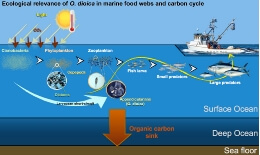Marine algae bloom-derived biotoxins alter the development of zooplankton and the ocean food web
Marine algae bloom-derived biotoxins alter the development of zooplankton and the ocean food web • The UB study warns on how the potential increase of microalgal blooms linked to climate change could affect marine ecosystems Researchers from the Department of Genetics, Microbiology and Statistics and members of the Biodiversity Research Institute (IRBio) of the University of Barcelona in collaboration with a team from the Zoological Station Anton Dohrn (Italy) have analysed the impact of diatom algae in the development of Oikopleura dioica (O. Dioica), a type of marine zooplankton invertebrate which plays an important role in the global dynamics of the marine food webs and the biosphere carbon cycle. The results, published in the new scientific journal from the group Nature Communications Biology, show that biotoxins that are produced by these algae at the end of the blooms can affect the embryonic development, and therefore the reproduction of this species, with severe ecological consequences.
The study, led by UB lecturers Ricard Albalat and Cristian Cañestero, is especially relevant considering that ocean acidification and warming caused by climate change could intensify the frequency of blooms in harmful algae like diatoms. The following UB researchers also took part in the research study: Núria P. Torres-Águila –first signer of the study-, Josep Martí Solans, Alfonso Ferrández, Alba Almazán and Vittoria Roncalli.
